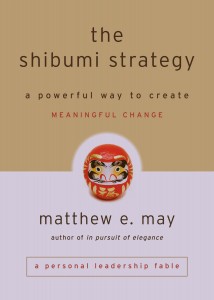By Marylene Delbourg-Delphis @mddelphis
 The shibumi strategy by Matthew E. May is both a parable and a lesson on the quiet aesthetic simplicity and transformative energy in Japanese culture. It all starts with Andy Harmon’s sudden misfortune. One day, his company closes. A good husband and good father (very much the image of the perfect, hardworking American for a magazine cover of the 50’s… only several decades later), he can’t just go back home to tell his family that he is out of the job and lament.
The shibumi strategy by Matthew E. May is both a parable and a lesson on the quiet aesthetic simplicity and transformative energy in Japanese culture. It all starts with Andy Harmon’s sudden misfortune. One day, his company closes. A good husband and good father (very much the image of the perfect, hardworking American for a magazine cover of the 50’s… only several decades later), he can’t just go back home to tell his family that he is out of the job and lament.
He has a few hours to find a solution in a small town with virtually no job openings except, perhaps, at the town’s only car dealership. After enjoying a corporate position in a customer service call center, Andy decides to try his luck as a salesman at Mainstreet Motors, something for which he doesn’t initially have the right profile. The result is that he must basically reinvent himself – and he does. Through a Zen self-discovery process, and a fair amount of trial and error, he finds out how to be something else than the stereotypical car salesman, and meets with success by building a long-term referral business.
All’s well that ends well. Albeit a little bit schmaltzy at times, this book is an interesting perspective on leadership. If you are tired of exhortative talks “(yes, think-hard-you-can do-it”) and of in-your-face leaders who gab about business and their grand exploits just as passionately as car salesmen go on and on about their Toyotathon sales events, read this book. It is focused on internalizing leadership, rebuilding your own balance to look at your environment with fresh eyes, and transforming what’s around you for the better. Leadership is about pulling, not about pushing, and “shibumi” is about effortless effectiveness. Incidentally, the author also refers to the Italian “sprezzatura,” with the new meaning that Baldassare Castiglione (1478-1529) gave to the word in the The Book of the Courtier: a sort of nonchalance, “so as to conceal all art and make whatever one does or says seem effortless, and almost unpremeditated.”

0 responses so far ↓
There are no comments yet...Kick things off by filling out the form below.
Leave a Comment